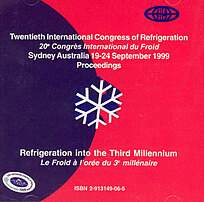
IIR document
Recent progress in the use of SQUIDS for non-destructive evaluation.
Author(s) : DONALDSON G. B., CARR C.
Summary
The authors report on recent developments in the use of SQUID (Superconducting Quantum Interference Device) sensors for the magnetic detection of a variety of surface-breaking and deep-lying flaws in metals, including iron, steel, aluminium and titanium. The methods employed are first magnetometry, in which the defect is polarised by a magnetic field and the induced dipole moment detected by a SQUID, and secondly galvanometry in which the flaws distort the flow of eddy currents excited in the specimen and the SQUID measures the subsequent distortion of the magnetic field generated by these currents. These developments have allowed non-destructive evaluation to be extended to a number of problems of concern, including the detection of deep lying defects in engineering structures such as pipe lines and reactor vessels, and in aircraft structures and components.
Available documents
Format PDF
Available
Public price
20 €
Member price*
Free
* Best rate depending on membership category (see the detailed benefits of individual and corporate memberships).
Details
- Original title: Recent progress in the use of SQUIDS for non-destructive evaluation.
- Record ID : 2000-1163
- Languages: English
- Source: 20th International Congress of Refrigeration: Refrigeration into the Third Millennium.
- Publication date: 1999/09/19
Links
See other articles from the proceedings (447)
See the conference proceedings
Indexing
-
What can SQUIDs tell about the human brain?
- Author(s) : KNUUTILA J.
- Date : 2002/07/22
- Languages : English
- Source: Proceedings of the nineteenth International Cryogenic Engineering Conference. ICEC 19.
View record
-
Remanent magnetization of instrument materials ...
- Author(s) : MESTER J. C., LOCKHART J. M.
- Date : 1996
- Languages : English
- Source: Proceedings of the 21st international conference on low temperature physics.
View record
-
SQUID et applications : état de l'art.
- Author(s) : DOLABDJIAN C.
- Date : 1997/04/02
- Languages : French
- Source: Cinquièmes Journées de cryogénie et de supraconductivité. Recueil des conférences et posters.
View record
-
Applications en électronique des supraconducteurs.
- Author(s) : VILLEGIER J. C.
- Date : 1997/04/02
- Languages : French
- Source: Cinquièmes Journées de cryogénie et de supraconductivité. Recueil des conférences et posters.
View record
-
Pulse tube refrigerator for high-critical tempe...
- Author(s) : THUMMES G., LANDGRAF R., GIEBELER F., MÜCK M., HEIDEN C.
- Date : 1996/07/17
- Languages : English
- Source: Advances in cryogenic engineering.
View record
